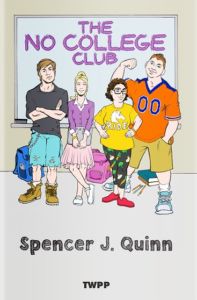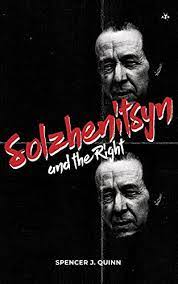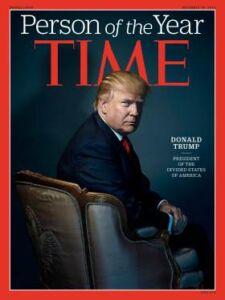Donald Trump’s Time Interview: The Return of the 2016 Trump
Donald Trump sat down for an extended interview with Time magazine reporter Eric Cortellessa on April 12 to discuss what a second Trump administration would look like. Two weeks later the pair talked again over the phone, and Time published the story soon after. An example of classic Leftist spin, Cortellessa’s story, with the chilling title “How Far Trump Would Go,” is not worth even a fraction of the 26 minutes Time says it will take to read. However, the transcript of their conversations are quite revealing — and not merely in terms of what a snake Cortellessa is for behaving so deferentially to Trump in person only to later twist Trump’s words when submitting the story to his editors.
The transcript serves as a great reminder of why Trump got elected in 2016 and why he resonates so strongly with ordinary, conservative Americans. Not only this, but it shows how Trump seems to be reaching further to the Right than ever before. Of course, this doesn’t mean Trump will actually govern from the Right once he is elected in November (as he is currently projected to be). His first term, as good as it was, had its share of disappointments in this regard. But it does indicate that he knows all the correct things to say and is not afraid to include just about everyone on the Right as part of his base. I believe there is little in Trump’s Time transcript of which a pro-white dissident would disapprove.
Cortellessa starts with Trump’s promise to deport the millions of illegals that have been allowed into the United States under the Biden administration. Extemporaneous Trump may not be the best conversationalist, often editorializing for his own aggrandizement and dropping and resuming threads mid-sentence, but on the topic of the illegal immigration and what to do about it, he was spot on:
I don’t believe this is sustainable for a country, what’s happening to us, with probably 15 million and maybe as many as 20 million by the time Biden’s out. Twenty million people, many of them from jails, many of them from prisons, many of them from mental institutions.
Trump explains that by using President Dwight Eisenhower as an example, he would rely on local police and the National Guard to carry out these deportations. This, of course, did not stop Cortellessa from asking Trump on four occasions if he would employ the military to rid the country of these illegals. Trump seemed uncomfortable with this possibility and professed on several occasions that the National Guard would be sufficient. But like the little train that could, Cortellessa kept pressing, which led to this burst of common sense from Trump:
Cortellessa: Sir, the Posse Comitatus Act says that you can’t deploy the US military against civilians. Would you override that?
Trump: Well, these aren’t civilians. These are people that aren’t legally in our country. This is an invasion of our country. An invasion like probably no country has ever seen before. They’re coming in by the millions. I believe we have 15 million now. And I think you’ll have 20 million by the time this ends. And that’s bigger than almost every state.
Cortellessa: So you can see yourself using the military to address this?
Trump: I can see myself using the National Guard and, if necessary, I’d have to go a step further. We have to do whatever we have to do to stop the problem we have.
Cortellessa then pressed Trump on possible new migrant detention camps, a prospect which Trump downplayed several times but, appropriately, did not rule out. In fact, he stated that “we shouldn’t have to do very much of it, because we’re going to be moving them out as soon as we get to it.”
This, apparently, was the answer Cortellessa was digging for, since it’s the source for the following misleading sentence in his Time story:
To carry out a deportation operation designed to remove more than 11 million people from the country, Trump told me he would be willing to build migrant detention camps and deploy the US military, both at the border and inland.
Cortellessa later asked Trump about his promise to “protect police from prosecution,” and again Trump was on point. Yes, he admitted that there are bad police officers who do bad things — but:
. . . there are far more problems with what’s happened now, where police are standing outside of a department store as it’s being robbed and 500 mostly young people are walking out carrying air conditioners and televisions and everything else. And the police would like to do something about it. But they’re told to stand down. They said don’t do it. And if you do anything about it, if you stop crime, we’re going to go after your pension, your home, your family, your wife or your husband. And you know, police are being prosecuted all the time. And we want to give them immunity from prosecution if they’re doing their job.
It’s hard not to appreciate the way in which Trump cites specifics to make his point. He’s also free as can be of ideological blinders. He doesn’t care about woke theories of crime, class, and race. He only cares about reducing crime, which is better for everyone.
The pair then detoured onto the subject of the economy, where Trump defended at length his promise to employ aggressive tariffs once back in office. Cortellessa tried to insert the idea that tariffs increase prices, and Trump let him have it with his down-to-the-dollar analysis of global trade. This is Trump’s wheelhouse, after all, and he made it clear that he understands why the United States has to fight as dirty as its competitors in the world market do, and why we need to build manufacturing here and not overseas.
Upon reading Trump’s many words on this topic, it became clear that he, unlike any President since perhaps Ronald Reagan, doesn’t view money as toy money. He actually values money — especially American money. He does so seemingly on a personal level. He understands what a shame it is when money gets wasted and what a travesty it is when one gets swindled out of it. In his first term, he made it a priority to minimize both, and blessed pre-COVID America with the best economy in decades. This, I believe, is one thing his supporters appreciate about him.
Next up was Israel, and if there is going to be a sticking point for dissidents when it comes to Trump the sequel, this is it. There were no surprises here for me except one. Yes, Trump had plenty of nits to pick about Israel’s conduct in the war. Yes, Trump had plenty of bones to pick with Israeli Prime Minister Benjamin Netanyahu. And yes, Trump touted his loyalty to Israel as expected. Jews, as we all know, are the moneymen of politics, and sadly, one will not get very far in the upper echelons of politics without at least some of them in one’s corner — despite how often their agendas diverge from that of white Americans. They have a way of making things extremely difficult if you cross them. One recent example is Kentucky Representative Thomas Massie, who staunchly opposes US foreign aid to Israel. While he condemned the October 7 Palestinian attack upon Israel, he also voted against the House resolution to support Israel in its resulting war. He’d rather that money be used to secure America’s southern border.
My election is in 12 days. AIPAC superPAC just bought $300,000 of ads against me because I am often the lone Republican for freedom of speech, against foreign aid, and opposed to wars in the Middle East.
I am urgently requesting your financial help here: https://t.co/AgJY01IWPL pic.twitter.com/8v5bMgmKqB
— Thomas Massie for Congress (@MassieforKY) May 9, 2024
Massie is an America-first conservative politician who walks it like he talks it — even when it comes to America’s “greatest ally.” Because of this, he is now walking into the teeth of Jewish power. In the days leading up to his May 21 primary, the United Democracy Project (UDP), an affiliate of the American Israel Public Affairs Committee (AIPAC), has spent nearly $300,000 on attack ads against him. The Jews are trying to bury the guy, essentially. The UDP has raised nearly $50 million since the beginning of 2023, so they have the means to do so.
Instead of standing with Israel, @RepThomasMassie voted with @AOC, @RashidaTlaib, @Ilhan, @JamaalBowmanNY, and @SummerForPA.
Massie and the Squad:
❌ Opposed supporting Israel.
❌ Opposed condemning Hamas. pic.twitter.com/coNhzgHSyi
— AIPAC (@AIPAC) October 30, 2023
Now here is a question: How many of us who blithely condemn Trump as a shill and a cuck when he plays footsie with Israel have even heard of Thomas Massie? Better yet, how many of us have contributed to his campaign? The day American whites start to organize well enough to counter-fund AIPAC will be the day we give our politicians the breathing room to separate our interests from Israel’s.

You can buy Spencer J. Quinn’s young adult novel The No College Club here.
In the meantime — and I’m sorry to have to be blunt about this — we need to put up or shut up.
Is it a disgrace that America places a foreign country’s security over its own? Yes. Is it unfortunate that Donald Trump is forced to play along with this? Yes. But at least Trump selects America-second Jews to back him rather than America-last Jews such as the Democrats and some Republicans. This is not ideal, of course. But it does make Trump the lesser of many evils when it comes to Israel and the Jews.
As for the one surprise in the Trump-Cortellessa transcript, it’s that Trump actually blames Netanyahu for the October 7 attack — and not for his treatment of the Palestinians (whom, as I have said before, are not really what this is all about). Essentially, Israel is too well-funded by the US not to have known that the attack was imminent:
No, it happened on his [Netanyahu’s] watch. And I think it’s had a profound impact on him, despite everything. Because people said that shouldn’t have happened. They have the most sophisticated equipment. They had — everything was there to stop that. And a lot of people knew about it, you know, thousands and thousands of people knew about it, but Israel didn’t know about it, and I think he’s being blamed for that very strongly, being blamed.
So unlike Israel-firsters such as Nancy Pelosi and Nikki Haley, Trump is allowing clever dissidents to connect the dots. Assuming that the rationale for American foreign aid to Israel is to achieve stability in the Middle East — which has been subsequently exploded by Israel’s vindictive ethnic cleansing of Gaza — we are left with two possible options. Either the Israelis are incompetent good-faith actors who waste American taxpayer dollars, or they are competent bad-faith actors who waste American taxpayer dollars. In either case, by screwing the pooch on October 7, Israel does not deserve another penny of American aid. Of course, Trump presumes the former option and pins it all on Netanyahu. But he fortunately doesn’t rule out the latter option, which suggests that Israel knew about the attack in advance and let it happen in order to manufacture a causus belli against the Palestinians. Thank you, Mr. Trump.
After a long and fairly tedious discussion of abortion, in which Trump asserted repeatedly that it was no longer a federal issue thanks to the overturning of Roe v. Wade in 2022, he expressed distrust and skepticism of the FBI — another nod to the Right-wing sector of his base. After the events of January 6, 2021, no conservative or Right-winger in America has cause to trust the FBI on anything in lieu of the overwhelming evidence. Trump seems to understand this (the editor’s note is in the original):
Cortellessa: . . . but the FBI said that there was a 13% drop in 2023. [Editor’s note: This statistic refers specifically to homicides.]
Trump: I don’t believe it. No, it’s a lie. It’s fake news.
Cortellessa: Sir, these numbers are collected by state and local police departments across the country. Most of them support you. Are they wrong?
Trump: Yeah. Last night. Well, maybe, maybe not. The FBI fudged the numbers and other people fudged numbers. There is no way that crime went down over the last year. There’s no way because you have migrant crime. Are they adding migrant crime? Or do they consider that a different form of crime?
Cortellessa: So these local police departments are wrong?
Trump: I don’t believe it’s from the local police. What I saw was the FBI was giving false numbers.

You can buy Spencer J. Quinn’s Solzhenitsyn and the Right here.
If white Americans are going to get anywhere when it comes to taking back at least a portion of their country for themselves, they’re going to have to distrust the anti-white elites currently in charge. To his great credit, Donald Trump actually encourages this mindset.
After a long discussion of Trump’s ongoing legal battles with spiteful and corrupt black prosecutors such as Alvin Bragg, Fani Willis, and Leticia James — as well as with Jack Smith, whom Trump referred to twice as “deranged” — Trump made it clear that Joe Biden is behind it all. He also floated the idea of pardoning all the January 6 protestors. When Cortellessa challenged him on this, Trump appropriately responded by pointing out that the sins of the Left during the Summer of Floyd were far worse than what happened on January 6:
It’s a two-tier system. Because when I look at Portland, when I look at Minneapolis, where they took over police precincts and everything else, and went after federal buildings, when I look at other situations that were violent, and where people were killed, nothing happened to them. Nothing happened to them. I think it’s a two-tier system of justice. I think it’s a very, very sad thing. And whether you like it or not, nobody died other than Ashli.
It was also nice that Trump referred to murder victim Ashli Babbitt by her first name. I know that he hasn’t always shown loyalty to the J6 protestors, and therefore this might end up being for naught. But as far as optics go for a person trying to win the most important election in the world, it’s excellent.
After this, Trump and Cortellessa discussed Trump’s threat to eviscerate the Deep State, his goal to simply fire people in the future rather than allow them to resign with dignity, his promise not to challenge the 22nd Amendment, and his tough stance on the North Atlantic Treaty Organization (NATO). Even Cortellessa admitted that because of Trump’s refusal to defend deadbeat NATO nations in the event of an attack from outside — say, from Russia — the organization then received an influx of $100 billion from its formerly-delinquent members. Perhaps the reason why Trump toots his own horn all the time is because the mainstream media never does it, even when he creates a splendid win-win situation as he did with NATO.
Two weeks later, during their discussion over the phone, is where Trump had another one of his finest moments. After recapitulating the abortion issue and the Gaza War, and discussing another one of Trump’s good ideas (a minimum ten-year jail sentence for anyone who defaces a public monument), Cortellessa asked him specifically about anti-white racism and whether it is a greater problem than anti-black racism:
Trump: Oh, I think that there is a lot to be said about that. If you look at the Biden Administration, they’re sort of against anybody depending on certain views. They’re against Catholics. They’re against a lot of different people. They actually don’t even know what they’re against, but they’re against a lot. But no, I think there is a definite anti-white feeling in this country and that can’t be allowed either.
Cortellessa: How would you address that as President?
Trump: I don’t think it would be a very tough thing to address, frankly. But I think the laws are very unfair right now. And education is being very unfair, and it’s being stifled. But I don’t think it’s going to be a big problem at all. But if you look right now, there’s absolutely a bias against whites and that’s a problem.
I know this is weak tea compared to what one would find on sites such as this one. Trump could have dwelled on the topic more and offered more details on what he intends to do about anti-whiteism once reelected. Perhaps he’ll do nothing. Still, this sort of talk coming from a former and most likely future President is a welcome and much-needed development. It will give both tacit and overt white advocates encouragement to hold President Trump’s feet to the fire if he allows anti-whiteism to fester on his watch. It edges the Overton window closer to white identity politics and marks a definite improvement from the past. It is also a crucial step toward the ultimate formation of a white ethnostate in North America. Can anyone even remember the last time a serious Republican presidential candidate not named Pat Buchanan ever spoke in such frank terms about white interests? It likewise enraged Whoopi Goldberg, which is a beautiful thing in and of itself.
We should all keep in mind that it’s relatively easy to be a purist when you’re not working in the world of actual politics — and, no, writing essays such as this one does not qualify; being elected to your district’s school board to fight wokeism, say, does. From a purist’s standpoint, Donald Trump certainly falls short. His record is not even close to perfect, and he has betrayed his base on numerous occasions — just ask Ann Coulter. Then again, who wouldn’t fall short in the eyes of a purist? More importantly, who wouldn’t fall a lot further short than Donald Trump in the eyes of this selfsame purist? Really, no one.
Perhaps when discussing what is ideal and pushing for local changes — and I consider the global pro-white sphere to be electronically local — being a purist can bear fruit. But when discussing what is actual and pushing for change outside your local milieu, then it serves to lower your standards and be less of a purist and more of a realist. And if there is one thing that the Time interview transcript tells us about Donald Trump, it’s that from a realist’s standpoint, he’s actually quite good. In fact, we’re lucky to have him.



